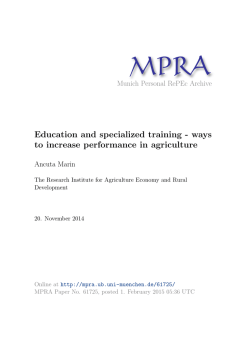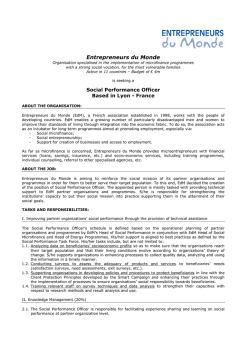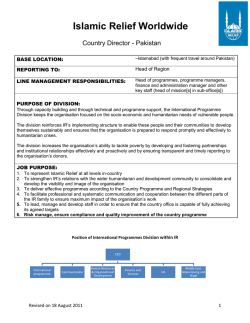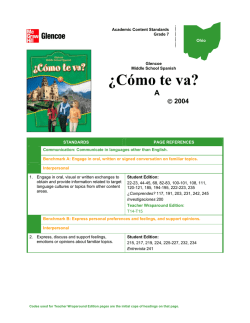
Subject Benchmark Statement - The Quality Assurance Agency for
Subject Benchmark Statement Optometry: Draft for Consultation January 2015 Contents How can I use this document? .............................................................................................. 1 About Subject Benchmark Statements .................................................................................. 2 About this Subject Benchmark Statement ............................................................................. 4 1 Introduction .................................................................................................................... 5 2 Defining principles.......................................................................................................... 7 3 Nature and extent of optometry ...................................................................................... 8 4 Subject knowledge and understanding ........................................................................... 9 5 Generic and subject-specific skills ............................................................................... 11 6 Teaching, learning and assessment ............................................................................. 13 7 Benchmark standards .................................................................................................. 16 Appendix: Membership of the benchmarking and review groups for the Subject Benchmark Statement for optometry...................................................................................................... 18 How can I use this document? This document is a Subject Benchmark Statement for optometry, that defines what can be expected of a graduate in the subject, in terms of what they might know, do and understand at the end of their studies. You may want to read this document if you are: involved in the design, delivery and review of programmes of study in optometry or related subjects a prospective student thinking about studying optometry, or a current student of the subject, to find out what may be involved an employer, to find out about the knowledge and skills generally expected of a graduate in optometry. Explanations of unfamiliar terms used in this Subject Benchmark Statement can be found in the Quality Assurance Agency for Higher Education's (QAA's) glossary.1 1 The QAA glossary is available at: www.qaa.ac.uk/about-us/glossary. 1 About Subject Benchmark Statements Subject Benchmark Statements form part of the UK Quality Code for Higher Education (Quality Code) which sets out the Expectations that all providers of UK higher education reviewed by QAA are required to meet.2 They are a component of Part A: Setting and Maintaining Academic Standards, which includes the Expectation that higher education providers 'consider and take account of relevant Subject Benchmark Statements' in order to secure threshold academic standards.3 Subject Benchmark Statements describe the nature of study and the academic standards expected of graduates in specific subject areas, and in respect of particular qualifications. They provide a picture of what graduates in a particular subject might reasonably be expected to know, do and understand at the end of their programme of study. Subject Benchmark Statements are used as reference points in the design, delivery and review of academic programmes. They provide general guidance for articulating the learning outcomes associated with the programme but are not intended to represent a national curriculum in a subject or to prescribe set approaches to teaching, learning or assessment. Instead, they allow for flexibility and innovation in programme design within a framework agreed by the subject community. Further guidance about programme design, development and approval, learning and teaching, assessment of students, and programme monitoring and review is available in Part B: Assuring and Enhancing Academic Quality of the Quality Code in the following Chapters:4 Chapter B1: Programme Design, Development and Approval Chapter B3: Learning and Teaching Chapter B6: Assessment of Students and the Recognition of Prior Learning Chapter B8: Programme Monitoring and Review. For some subject areas, higher education providers may need to consider other reference points in addition to the Subject Benchmark Statement in designing, delivering and reviewing programmes. These may include requirements set out by professional, statutory and regulatory bodies, national occupational standards and industry or employer expectations. In such cases, the Subject Benchmark Statement may provide additional guidance around academic standards not covered by these requirements.5 The relationship between academic and professional or regulatory requirements is made clear within individual statements, but it is the responsibility of individual higher education providers to decide how they use this information. The responsibility for academic standards remains with the higher education provider who awards the degree. Subject Benchmark Statements are written and maintained by subject specialists drawn from and acting on behalf of the subject community. The process is facilitated by QAA. In order to ensure the continuing currency of Subject Benchmark Statements, QAA initiates regular reviews of their content, five years after first publication, and every seven years subsequently. 2 The Quality Code, available at www.qaa.ac.uk/assuring-standards-and-quality/the-quality-code, aligns with the Standards and Guidelines for Quality Assurance in the European Higher Education Area, available at: www.enqa.eu/wp-content/uploads/2013/06/ESG_3edition-2.pdf. 3 Part A: Setting and Maintaining Academic Standards, available at: www.qaa.ac.uk/assuring-standards-andquality/the-quality-code/quality-code-part-a. 4 Individual Chapters are available at: www.qaa.ac.uk/assuring-standards-and-quality/the-quality-code/qualitycode-part-b. 5 See further Part A: Setting and Maintaining Academic Standards, available at: www.qaa.ac.uk/assuringstandards-and-quality/the-quality-code/quality-code-part-a. 2 Relationship to legislation Higher education providers are responsible for meeting the requirements of legislation and any other regulatory requirements placed upon them, for example, by funding bodies. The Quality Code does not interpret legislation nor does it incorporate statutory or regulatory requirements. Sources of information about other requirements and examples of guidance and good practice are signposted within the Subject Benchmark Statement where appropriate. Higher education providers are responsible for how they use these resources.6 Equality and diversity The Quality Code embeds consideration of equality and diversity matters throughout. Promoting equality involves treating everyone with equal dignity and worth, while also raising aspirations and supporting achievement for people with diverse requirements, entitlements and backgrounds. An inclusive environment for learning anticipates the varied requirements of learners, and aims to ensure that all students have equal access to educational opportunities. Higher education providers, staff and students all have a role in, and responsibility for, promoting equality. Equality of opportunity involves enabling access for people who have differing individual requirements as well as eliminating arbitrary and unnecessary barriers to learning. In addition, disabled students and non-disabled students are offered learning opportunities that are equally accessible to them, by means of inclusive design wherever possible and by means of reasonable individual adjustments wherever necessary. 6 See further the UK Quality Code for Higher Education: General Introduction, available at: www.qaa.ac.uk/publications/information-and-guidance/publication/?PubID=181. 3 About this Subject Benchmark Statement This Subject Benchmark Statement refers to bachelor's degrees with honours and master's degrees in optometry.7 This version of the statement forms its third edition, following initial publication in 2002 and review and revision in 2007.8 Note on alignment with higher education sector coding systems Programmes of study which use this Subject Benchmark Statement as a reference point are generally classified under the following code in the Joint Academic Coding System (JACS), although other codes may also be in use.9 B510 (Optometry). 7 Bachelor's degrees are at level 6 in The Framework for Higher Education Qualifications in England, Wales and Northern Ireland (2008) and level 10 in the Scottish Credit and Qualifications Framework (2001), and master's degrees are at level 7 and level 11 respectively. 8 Further information is available in the Recognition Scheme for Subject Benchmark Statements, available at: www.qaa.ac.uk/publications/information-and-guidance/publication?PubID=190. 9 Further information about JACS is available at: www.hesa.ac.uk/content/view/1776/649. 4 1 Introduction 1.1 Optometrists are primary healthcare specialists trained to examine the eyes for defects in sight, ocular diseases and problems related to general health. These functions are reserved to registered optometrists and general medical practitioners by the Opticians Act 1989. Optometrists are also licensed to fit and supply optical appliances such as spectacles, contact lenses and low vision aids. 1.2 Optometrists are responsible for the detection, diagnosis and management of ocular disease and the rehabilitation of conditions of the visual system. They provide the majority of primary eye care in the UK and are responsible for a significant proportion of ocular referrals to the secondary care sector. 1.3 The General Optical Council (GOC) is the statutory regulatory body for optometrists (and dispensing opticians) in the UK. A person is not permitted to practise as an optometrist in the UK unless registered with the GOC. The GOC gains its powers from the Opticians Act 1989. The main objective of the GOC, in exercising those functions which affect the health and safety of members of the public, is to protect, promote and maintain their health and safety. The GOC has the general function of promoting high standards of professional education, conduct and performance among registrants, and the additional functions assigned to the GOC under Section 2 of the Opticians Act 1989. 1.4 Since September 2005 every student studying towards a degree in optometry must, by law (Section 8A of the Opticians Act 1989 and The General Optical Council Registration Rules 2005), register with the GOC on an annual basis. Student registration has been implemented in order to safeguard the general public. Optometry students come into contact with patients during their degree programmes and pre-registration period. The GOC needs to ensure that only those people suited to working within optometry are able to gain experience of clinical practice, and study towards the necessary qualifications. Students who do not register will be breaking the law. A further consequence of non-registration is that students may not be covered by the supervisor's or university's professional indemnity insurance policy. Programme directors ensure that students do not undertake clinical work until GOC registration is confirmed. 1.5 The extension of the scope of optometric practice allows optometrists to carry out some functions which were previously in the secondary care sector. The basis for referral to secondary care in some areas of practice has changed, having an impact on the training and education needs of students. These changes have required consideration of curricula content, and, in particular, demonstrate an increased emphasis on clinical pharmacology and therapeutics, and the optometric management of ocular disease. 1.6 Registered optometrists examine the eye and visual system to establish their state of health and to provide, if necessary, spectacles or contact lenses to optimise visual performance. They also recommend other treatments or visual aids, where appropriate. Optometrists are trained to recognise eye diseases; managing such cases themselves or referring for further specialist investigations and/or treatment. Optometrists are eye care practitioners working in a wide variety of settings including community practice, hospital eye departments, university teaching and research, charities and industry. 1.7 Most optometry students follow a similar undergraduate degree programme followed by a pre-registration period working under the supervision of a registered experienced optometrist. This period of postgraduate work-based training is managed and assessed by the College of Optometrists on behalf of the GOC. 5 1.8 The GOC also recognises master's level programmes incorporating periods of supervised practice in hospitals and community practice embedded within the curriculum. Successful completion of such programmes is accepted by the GOC for direct entry to the Register of Optometrists. 1.9 Optometry programmes are designed to provide students with the knowledge and skills necessary to enter careers in all areas of optometry. The precise requirements for registration as an optometrist in the UK are the responsibility of the GOC and are subject to regular review. 6 2 Defining principles 2.1 This Subject Benchmark Statement articulates the key qualities expected of optometry students, who are eligible, following an approved programme of study, to enter directly into a period of pre-registration training10 or, as appropriate, to be admitted directly to the Register of Optometrists. 2.2 Benchmark standards in optometry are related to four major aspects of provision that are evident in all programmes leading to a bachelor's or master's degree: the nature and extent of the subject as defined by the aims and objectives of bachelor's and integrated master's awards the essential subject matter components that may be expected to be covered in all programmes leading to such degrees the generic transferable abilities, competencies and skills to be developed by students through the degree programmes recommendations concerning procedures for the assessment of the knowledge, abilities and skills outlined above and the criteria for eligibility for direct entry into pre-registration training. 2.3 The purpose of this statement is to provide a composite framework within which programme providers may develop purposeful and challenging optometry programmes that respond to the needs of their students, the NHS and employers, as well as to the changing nature of the subject. It is not the intention to impose rigid conditions on providers that would stifle innovation in programme design or delivery. 2.4 Details of the aims, objectives and content of specific programmes will be found in documentation issued by the respective UK higher education providers offering optometry degrees.11 10 The GOC requires students entering supervised pre-registered practice to achieve at least a lower second class bachelor's degree with honours. 11 A list of GOC approved institutions can be found at: www.optical.org/en/Education/What_to_study_and_where/index.cfm. 7 3 Nature and extent of optometry 3.1 Optometry programmes produce graduates with a professional aptitude who are safe to practise under supervision within the pre-registration environment or, as appropriate, to enter unsupervised practice as a registered optometrist. 3.2 Graduates' theoretical knowledge and clinical competence also provides a basis for continuing professional development to ensure they are equipped to meet the changing demands of healthcare delivery in the UK. The GOC requires all registered optometrists to undertake continuing education and training as a condition of continued registration. 3.3 Graduates have an understanding of public health issues which enables them to apply their knowledge in the areas of health needs such as management of eye disease, screening, audit and clinical governance. This requires knowledge of the underlying concepts of health delivery systems with particular emphasis on primary care. 3.4 Programmes in optometry develop students' expertise in broadly four areas. Visual system functions and their correction: - a broad and integrated knowledge of the theoretical and applied principles of the anatomical, physiological and perceptual aspects of the visual system - a detailed knowledge of refractive, visual and oculomotor anomalies of the visual system, their investigation and correction - a detailed knowledge of a wide range of optical appliances, including relevant standards, and the ability to dispense satisfactorily to patients - a knowledge of occupational visual standards, in order to assess compliance and offer appropriate advice to patients. Ocular health assessment and management: - an understanding of ocular and systemic disease to a level necessary to function as effective primary care optometric practitioners - an ability to detect, recognise, diagnose and manage ocular health issues as appropriate. Professionalism and leadership: - an understanding of the expectations and responsibilities of entering a regulated healthcare profession - interpersonal skills so that graduates may communicate effectively with all types of patients, carers and other healthcare professionals - an awareness of the legal, ethical and commercial restraints and constraints within which optometry operates - an understanding of legislation relating to the use and supply of ophthalmic drugs - an understanding of the role of optometry as a primary and secondary healthcare profession within the UK healthcare system. Application and translation of expertise: - an ability to understand and apply the principles of evidence-based practice to clinical decision making - an ability to undertake critical evaluation of research into optometry and vision sciences and to translate theory into practice in a clinical setting - a sound scientific knowledge of the discipline in support of clinical practice and lifelong learning - a range of generic skills, as outlined in Section 5. 3.5 Programmes of study enable students to acquire subject knowledge and understanding in basic and clinical sciences, as well as generic and subject-specific skills. The curriculum is expected to contain the components detailed in section 4. 8 4 Subject knowledge and understanding 4.1 Optometry programmes are likely to include the following areas of knowledge within the basic and clinical sciences. Basic sciences 4.2 Graduates have knowledge and understanding of the fundamental scientific principles relevant to the practice of optometry in the context of primary and secondary eye care. The scientific basis of the programme provides support for continuing professional development and lifelong learning. In particular, graduates are able to apply these principles to the following subject areas. Human biology 4.3 Graduates have knowledge of the principles of normal and abnormal human biology. This is applied to the detection, recognition, diagnosis, prevention and management of ocular and systemic conditions that may exist in patients presenting for primary and secondary eye care. 4.4 Graduates have knowledge of the principles of normal and abnormal ocular and visual biology. This is applied to the detection, recognition, diagnosis, prevention and management of ocular disease, trauma, developmental and ageing conditions presenting in patients seeking eye care. Visual perception and psychology 4.5 Graduates have knowledge of the principles of visual perception and psychology. This is applied to the use of investigative procedures for assessment of visual functions, and to advising patients on the interpretation of visual experiences and phenomena. Varied approaches to the psychology of interpersonal communication are also included to allow an understanding of the range of human behaviour presenting in patients seeking eye care. Optics and instrumentation 4.6 Graduates have knowledge of the principles of geometrical, physical and visual optics. This is applied to the understanding of optical instrumentation; ocular imaging technologies; correction of vision; and the detection, recognition, diagnosis, prevention and management of refractive, oculomotor and sensory integrative conditions presenting in patients seeking eye care. Clinical science 4.7 Graduates are able to apply knowledge of basic science and clinical experience to the investigation, diagnosis, management and prevention of visual disorders. Functional and developmental conditions 4.8 Graduates have knowledge of the normal development of the visual system and of the disruptive effects on development of congenital and infantile abnormalities and developmental disorders. They are competent in the diagnosis and management of functional and developmental visual conditions such as refractive error (ametropia), heterophoria, heterotropia, amblyopia and other anomalies of monocular and binocular vision. 9 4.9 Graduates have knowledge of the effects of ageing on the structure and functions of the visual system. They are competent in the diagnosis and management of age-related conditions such as cataract, macular degeneration, and those affecting the anterior eye and eyelids. Ophthalmic optics, dispensing and contact lenses 4.10 Graduates have knowledge of the design, materials and optical principles of devices for correction of vision. This enables them to dispense spectacles, contact lenses and low vision aids, instruct patients in their safe and efficient use, monitor progress with the appliance and assist patients to achieve maximum visual performance. 4.11 Graduates have knowledge of contact lens designs, materials and other characteristics, enabling them to select and assess the fit of a lens and determine the refractive correction required. 4.12 Graduates have knowledge of occupational, sporting and protective ophthalmic appliances to enable them to dispense the appropriate appliance to the required standards. Disease and abnormality 4.13 Graduates have knowledge of the differences between normal and abnormal ocular and visual conditions. They have an understanding of common systemic diseases which may have ocular manifestations. They are able to apply the principles of visual physiology and pharmacology to manage ocular abnormalities and are able to make appropriate management decisions including monitoring or referral for medical opinion. 4.14 Graduates have knowledge of the general principles of pharmaceutics, pharmacology and toxicology and are familiar with common systemic medications. They are aware of adverse ocular reactions to systemic medication. They have detailed knowledge of the pharmacological principles underlying the use of drugs to facilitate optometric examination and the diagnosis and treatment of ocular diseases. 4.15 Graduates have knowledge of specific cautions, contraindications and side effects of ophthalmic drugs so as to use or supply them safely. They also have knowledge of the law relating to the sale and supply of ophthalmic preparations as specified by the Human Medicines Regulations (2012). They are aware of adverse ocular reactions that may be induced by medical management of common systemic diseases. 10 5 Generic and subject-specific skills 5.1 The GOC maintains two lists of the core competencies and skills that students are required to demonstrate as a condition of entry to the pre-registration period (Stage 1 competencies) and later, following a period of supervised pre-registration experience, to unsupervised practice (Stage 2 competencies). Degree programmes equip graduates to carry out Stage 1 or Stage 1 and 2 competencies as appropriate.12 Generic skills 5.2 Graduates are able to demonstrate generic skills relating to professionalism and leadership: communication skills, covering both written and oral communication and the ability to relate to various social and ethnic groups time management and organisational skills sufficient learning skills to sustain lifelong learning and continuing professional development. 5.3 Graduates are able to demonstrate generic skills relating to the application and translation of expertise: technology skills involving word processing, data manipulation, organisation and presentation for self-directed and lifelong learning numeracy skills to evaluate data generated through audit and research problem-solving skills relating to qualitative and quantitative information the ability to undertake critical evaluation of relevant literature. Subject-specific skills Related, or in addition, to GOC competencies: 5.4 Graduates are able to demonstrate subject-specific skills relating to visual system functions and their correction: assess and correct errors of refraction for required viewing distances and positions assess and manage sensory and motor anomalies of vision, including binocular functions relate the management of visual functional anomalies to the occupational needs of the patient. 5.5 Graduates are able to demonstrate subject-specific skills relating to ocular health assessment and management: assess ocular structure and visual functions in order to detect and recognise abnormal conditions evaluate evidence from ocular and visual assessments to support clinical decisions formulate appropriate plans to manage and support patients with ocular health needs. 12 The core competencies may be found at www.optical.org/en/Education/core-competencies--corecurricula/index.cfm. 11 5.6 Graduates are able to demonstrate subject-specific skills relating to professionalism and leadership: demonstrate an appropriate professional attitude in their professional and private lives communicate effectively with patients and colleagues maintain clear, accurate and appropriate records have an awareness of their role within the healthcare sector, including the NHS appreciate the major issues relevant to the future development of optometry 5.7 Graduates are able to demonstrate subject-specific skills relating to application and translation of expertise: understand the application of information technology to patient management apply flexibility in addressing clinical problems of an unfamiliar nature review the evidence base for clinical interventions and have sufficient statistical knowledge to undertake critical evaluation of clinical research findings. 12 6 Teaching, learning and assessment 6.1 Higher education providers differ in their approach to the provision of learning, teaching and assessment, and are responsible for the content and balance of programmes. Although core components of the approved programme of study are prescribed by the GOC requirements, providers attempt to provide a distinctive approach to their provision to reflect the expertise of their academic staff. These programmes are subjected to internal and external quality assurance mechanisms to ensure they are fit for purpose and, where appropriate, fit for practice (see definitions in paragraphs 7.5 and 7.6). General characteristics 6.2 In all cases programmes demonstrate the following characteristics. Diversity of practices 6.3 Programmes incorporate a range of teaching and learning settings (for example lectures, tutorials, laboratories, clinics/hospitals) and practices (for example individual study, paired and team-based learning) that are relevant to the needs of the subject and student. Assessment procedures combine formative and summative methods, which in addition to evaluating scholarship and knowledge base take account of the educational and training requirements for entry to clinical work in a variety of optometric environments. Integration of theory and practice 6.4 Theoretical and clinical curricula are fully integrated in both structure and function; the former in terms of relevant programme pre and co-requisites, the latter in terms of amalgamation of didactic teaching and clinical practice. Minimum levels are prescribed by the GOC and are kept under review. Incremental learning 6.5 Progression in the ability of students to manage clinical situations and problems evolves from gradual acquisition and application of clinical skills supported by a sound framework of clinical and vision sciences. There is evidence of support for reflection to aid development. Teaching, learning and assessment protocols reflect this progression and are sufficiently flexible to incorporate new developments in educational technology and respond to future demands of primary and secondary healthcare. Autonomous learning 6.6 Emphasis on the importance and utility of developing an ability to engage in and develop independent and self-directed study includes: formal assessment of students' ability to assimilate and present information from a variety of sources available in traditional and electronic media a variety of assessment formats such as case presentations, case reports, literature reviews, dissertations, and practical projects presentation of methods for critical evaluation of research literature. 13 Continuing professional development 6.7 The aim of the programme is to achieve an appropriate and safe level of understanding, care and discrimination in promoting the ocular and visual wellbeing of patients. In addition the programme provides a foundation for continuing professional development and lifelong learning in support of best professional practice and the maintenance of professional standards. Specific elements of programme provision 6.8 Reflecting the general characteristics above, there is also evidence of the following elements of provision. Clinical experience 6.9 A substantial proportion of the programme of study involves practical applications in clinical settings. Adequate provision for optometric examination of a wide range of patients in relation to age, ocular conditions and refractive status includes: access to unselected patients instruction, demonstration and supervision by registered practitioners in general and specialist optometry clinics and in hospital ophthalmology clinics small-group clinical instruction which incorporates student observation, practitioner demonstration and direct student participation clinical placements in a variety of secondary healthcare settings to assimilate management strategies of other healthcare disciplines in the hospital sector. Clinical weighting 6.10 The examination weighting allocated to clinical assessment forms a substantial proportion of the final award, and includes: clinical conditions which enable students to demonstrate effectively both their level of attainment and their full range of abilities assessment in the clinical environment which takes account of both clinical knowledge and clinical skills. Communication skills 6.11 The assessment of the ability to communicate effectively with patients and professional colleagues through the application of a range of skills developed through didactic and clinical teaching and learning programmes includes: learning and teaching programmes which present the constructs of interpersonal behaviour in the context of clinical consultation in optometric practice and between professional colleagues interpersonal behaviours demonstrating sensitivity to the range of physical, emotional and intellectual variances in individuals employment of non-verbal communication to deal effectively with patients' concerns and confusion the ability to inform the patient of the outcomes of examinations and the need for referral an ability to recognise and respect, in all communications, the expectations and aspirations of patients and colleagues 14 effective communication being maintained while ensuring confidentiality and security of patient records in an ethical environment assessment procedures which demonstrate the multiplicity of communication skills required for effective examination and management of patients in relation to age, culture and special needs. 15 7 Benchmark standards 7.1 This statement provides a reference for the maintenance of the threshold standard of optometry degrees and defines the responsibilities expected of graduates entering a regulated healthcare profession. Students who are eligible on graduation to enter either into a pre-registration period or directly into registered practice demonstrate the following: an ability to communicate effectively with patients and professional colleagues through the application of a range of skills using English as the primary language of communication a systematic understanding of key aspects of optometry and vision science leading to the achievement of core competencies as defined by the GOC at Stage 1 or Stages 1 and 2 as appropriate an ability to apply the principles of evidence-based practice a detailed understanding of specific components of optometry or vision science which are at the forefront of knowledge and reflect the expertise of academic staff an ability to learn autonomously using scholarly reviews and primary sources to support the requirement for continuing professional development and lifelong learning an ability to apply established analysis and enquiry techniques to optometry a conceptual understanding to enable an evaluation of current research in optometry and vision science an appreciation of the uncertainty, ambiguity and limits of knowledge 7.2 Bachelor's programmes ensure that the graduate optometrist is able to: achieve all the GOC Stage 1 core competencies for optometry demonstrate appropriate knowledge, skills and attitudes required for entry into pre-registered clinical practice conduct appropriate tests and investigations of visual status in a safe and effective manner make appropriate decisions about the ocular health of patients show an appropriate professional attitude towards patients and colleagues demonstrate an understanding of the expectations and responsibilities of entering a regulated clinical profession demonstrate awareness of the primary and secondary healthcare function offered by optometry demonstrate an investigative approach to academic subjects and clinical practice which integrates theory and practice to identify and solve problems demonstrate an ability to apply research findings to practice understand his/her role within a multidisciplinary team analyse, and evaluate critically, diagnostic and therapeutic interventions demonstrate critical skills for the evaluation of new concepts, procedures, techniques and products relevant to optometric practice acquire a wide range of transferable, lifelong and independent learning skills. 16 7.3 In addition, master's degree programmes ensure that the graduate is able to: achieve all the GOC Stage 2 core competencies for optometry satisfy clinical experience requirements through periods of supervised practice in community optometry and hospital settings demonstrate higher level skills and competencies in some specialist areas of optometry demonstrate sufficient experience, knowledge and understanding of optometry to register with the GOC as a qualified optometrist without further assessment. 7.4 This statement identifies two levels of achievement, which can be described in terms of fitness for purpose and fitness for practice. Fitness for purpose 7.5 The completion of a bachelor's degree at the appropriate level of achievement above the threshold equates to the level of attainment needed for a graduate to enter directly into the pre-registration year of supervised practice. The criteria are as described in this statement and define explicitly the levels of competency commensurate with effective entry into the pre-registration period. This level of performance encompasses an adequate knowledge base and clinical skills for the safe practice of optometry in the pre-registration context.13 Fitness for practice 7.6 In addition to demonstrating appropriate performance at bachelor's degree level those students seeking direct entry to the Register of Optometrists must satisfy the requirements of a registrable master's degree. The criteria are as described in this statement and define explicitly the levels of competency commensurate with effective entry into independent practice. The level of performance encompasses an adequate knowledge base and clinical skills for the safe practice as a registered optometrist. 13 The GOC requires students entering supervised pre-registered practice to achieve at least a lower second class bachelor's degree with honours. See www.optical.org/en/Education/Criteria_for_registration/Optometrists/The_UK_route_to_registration_as_an_optom etrist.cfm. 17 Appendix: Membership of the benchmarking and review groups for the Subject Benchmark Statement for optometry Membership of the review group for the Subject Benchmark Statement for optometry (2014) Chair Dr James Gilchrist (chair) Higher education representatives Dr Frank Eperjesi Dr Katherine Evans William Holmes Professor John Lawrenson Professor Edward Mallen Professor Kathryn Saunders Dr John Siderov Dr Luisa Simo Professor Niall Strang Optometry Schools Council and University of Bradford Aston University Cardiff University University of Manchester City University London University of Bradford University of Ulster Anglia Ruskin University Plymouth University Glasgow Caledonian University Professional, statutory and regulatory body representatives Linda Ford General Optical Council Employer representatives Prakash Rughani Jane Gray Vision Care Jane Gray Eye Care Membership of the review group for the Subject Benchmark Statement for optometry (2007) Details provided below are as published in the second edition of the Subject Benchmark Statement for optometry. Dr Adrian Jennings Professor John Lawrenson Professor Rachel North Dr Kathryn Saunders Mrs Dian Taylor Professor Alan Tomlinson Professor Barry Winn (Chair) University of Manchester City University Cardiff University University of Ulster General Optical Council, London Glasgow Caledonian University University of Hull 18 Membership of the original benchmarking group for the Subject Benchmark Statement for optometry (2002) Details provided below are as published in the original Subject Benchmark Statement for optometry. Professor Michael Boulton Professor Bernard Gilmartin Dr Adrian Jennings Professor Daniel O'Leary Professor Alan Tomlinson Professor Barry Winn (Chair) Professor Edwin Woodward Mrs Dian Taylor Cardiff University Aston University University of Manchester Anglia Polytechnic University Glasgow Caledonian University University of Bradford The City University General Optical Council, London QAA1015 - Jan 15 © The Quality Assurance Agency for Higher Education 2015 Southgate House, Southgate Street, Gloucester GL1 1UB Tel: 01452 557 000 Email: [email protected] Website: www.qaa.ac.uk Registered charity numbers 1062746 and SC037786 19
© Copyright 2026








